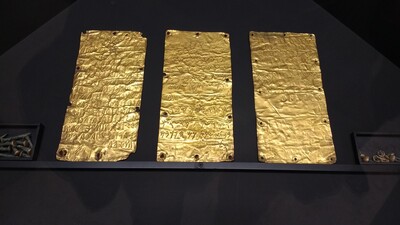Rome

We have come to the Etruscan museum to see a golden book; three sheets of incised gold written to Astarte, a Phoenician Goddess, in the sixth century BCE, before the identity ‘Roman’ came into being. One sheet is written in Pheonecian, and refers to the king of Carthage. The other two are written in Etruscan. I have read that the sheets are punched with holes by which they could be joined by strings into book form. However, the sheets are displayed with nails to fix them to a wall, not strings to join them. The holes are around each edge, not only the side to be joined. Not then, properly, a book. Now I am here I don’t mind that it’s not a book. The sheets could work as a book, also they are extremely old—considerably pre-dating the concept of a library. I surreptitiously draw the Bolex from a black cotton bag I am carrying on my shoulder. “Go away and look at something else,” I tell the children. “I am going to film it.” “Are you allowed to do that?” enquires Orla. “Maybe not,” I say, “so buzz off, in case we get into trouble.” They buzz off.
I look at the Phoenician script in gold, and part V of Eliot’s The Wasteland swims about me, with other scraps; “To Carthage then I came, burning.” This in turn provokes the opera I currently love best to play silently in my head, which is Purcell’s Dido and Aeneas. This is followed by fragments of the Aeneid, translated by Seamus Heaney. I let this happen to me for a while. I’m not sharing this as some sort of checklist. I sometimes don’t really enjoy it when a cascade like this is knocked into momentum in my mind, because sometimes it’s invasive. I’ve caught myself muttering “Fuck off, TS Eliot!” to myself, which I should not do because it’s eccentric. Today, I like it, though I keep it to myself. “A current under sea picked his bones in whispers as he rose and fell.” The golden text wasn’t found until 1964. That’s after The Wasteland was written. Although there’s no book here, I am glad that the quest for it has brought me to this former Papal Villa; an empty, tranquil space far from the crowds that swarm the Forum.
I stow the camera out of sight, though there’s really nobody to see, and walk through the rooms of ancient shards and figures. Many of them bear text. I learn that objects were given voice by these texts. They speak themselves through the reader, because in ancient times text was always read aloud. In the fourth century Augustine noted his surprise that Ambrose read silently.
Here I discover that italic, of script, simply means italic, as in Italianate. I am delighted by this, but did I know it before? I’m very forgetful which is a disability that nevertheless allows me the enjoyment of learning to be experienced more than once with the same information.


